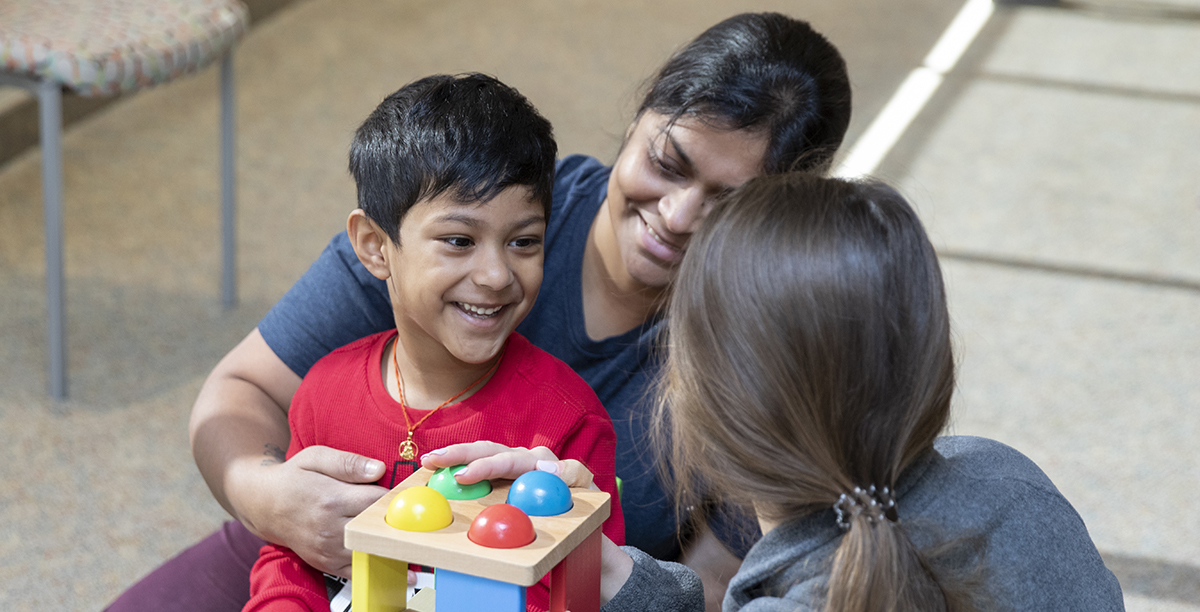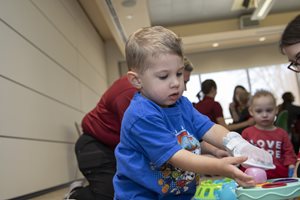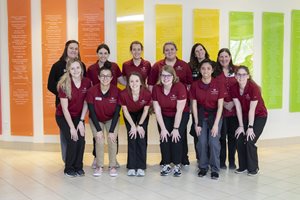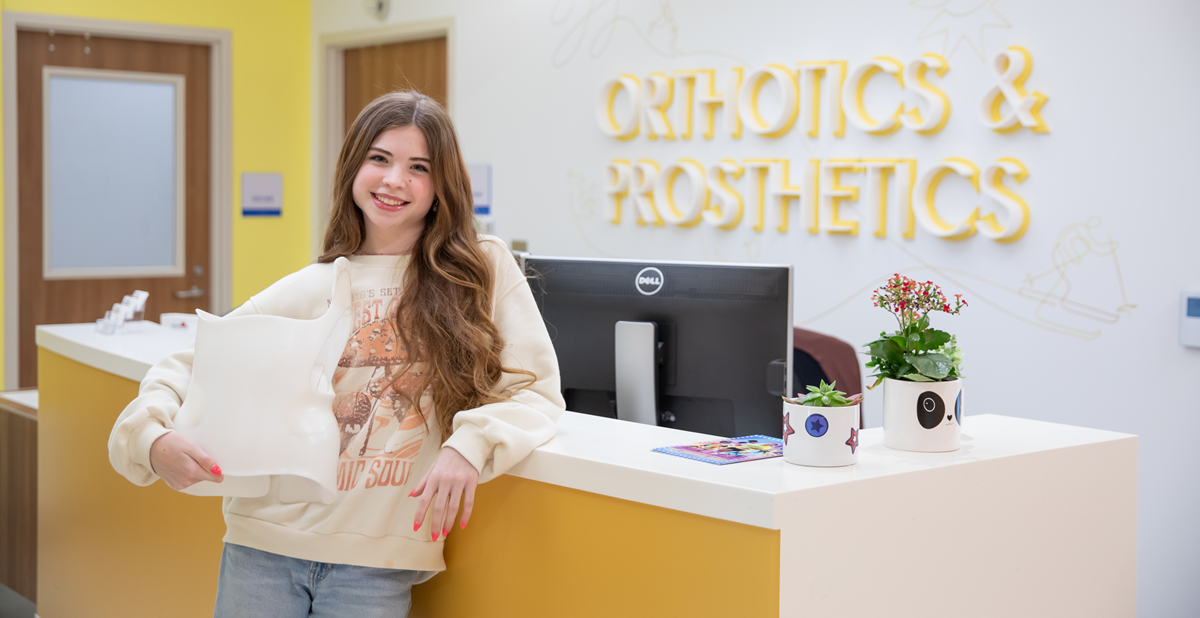
Feb 14, 2020 / Research & Innovation
A New Research Program Helps to Diagnose and Treat Cerebral Palsy Earlier
As an institution, the commitment to research continues to help guide our experts in providing the best and most innovative care. With a focus of treating the whole child – mind, body and spirit, the research conducted analyzes the common to the complex of conditions to help provide answers and treatment options for the patient and family.
The Neurology & Rehabilitation Medicine department is recognized internationally for its care for children with cerebral palsy. As a condition that can present at birth or during the early developmental years, it requires ongoing research and collaboration of our multidisciplinary team to advance the care for this patient population.
The team conducts an ongoing research project called the constraint induced movement therapy (CIMT). This two-week research program is for children diagnosed with hemiplegic (one side of the body) cerebral palsy. Throughout the therapy, the patient’s stronger arm is put into a splint to force them to use the affected arm for all daily activities.

This week, the Neurology team is launching Baby CIMT – a similar program but specifically for infants and toddlers from 3 months to 4 years old. Also known as Therapy Together, the purpose of this study is to diagnose CP earlier in order to start treatment sooner and provide training for families to help their children at home on a daily basis. For children with cerebral palsy or for those at risk of developing the condition, this program allows the child and the caregiver to engage together while focusing on the constraint induced movement therapy.
Throughout the eight-week program, the group sessions coach the caregivers on how to implement this type of therapy into the child’s home environment. Each week has a different focus all while building on what has been taught during the previous sessions. Overall, the goal of the program is to improve the child’s hand function while also enhancing the caregiver’s ability to help and coach their child with this type of therapy.
Led by research occupational therapists Angela Shierk, Ph.D., O.T.R., and Heather Roberts, P h.D., O.T.R., pediatric clinical nurse specialist Nancy Clegg, Ph.D., R.N., and neurology research coordinator Debbie Baldwin, B.S., this multidisciplinary team works closely with children diagnosed with cerebral palsy and can see the impact these programs are making. “The children seen in our clinics require specialized care,” says Clegg. “Much like the other conditions our experts treat, cerebral palsy can be very complex, and the child may need treatment from various specialists within the hospital. The Baby CIMT research program allows us to learn more about the condition earlier in the child’s life and implementing this therapy to increase their function and overall quality of life.”
h.D., O.T.R., pediatric clinical nurse specialist Nancy Clegg, Ph.D., R.N., and neurology research coordinator Debbie Baldwin, B.S., this multidisciplinary team works closely with children diagnosed with cerebral palsy and can see the impact these programs are making. “The children seen in our clinics require specialized care,” says Clegg. “Much like the other conditions our experts treat, cerebral palsy can be very complex, and the child may need treatment from various specialists within the hospital. The Baby CIMT research program allows us to learn more about the condition earlier in the child’s life and implementing this therapy to increase their function and overall quality of life.”
Learn more about the Neurology and Rehabilitation Medicine department.
The Neurology & Rehabilitation Medicine department is recognized internationally for its care for children with cerebral palsy. As a condition that can present at birth or during the early developmental years, it requires ongoing research and collaboration of our multidisciplinary team to advance the care for this patient population.
The team conducts an ongoing research project called the constraint induced movement therapy (CIMT). This two-week research program is for children diagnosed with hemiplegic (one side of the body) cerebral palsy. Throughout the therapy, the patient’s stronger arm is put into a splint to force them to use the affected arm for all daily activities.

This week, the Neurology team is launching Baby CIMT – a similar program but specifically for infants and toddlers from 3 months to 4 years old. Also known as Therapy Together, the purpose of this study is to diagnose CP earlier in order to start treatment sooner and provide training for families to help their children at home on a daily basis. For children with cerebral palsy or for those at risk of developing the condition, this program allows the child and the caregiver to engage together while focusing on the constraint induced movement therapy.
Throughout the eight-week program, the group sessions coach the caregivers on how to implement this type of therapy into the child’s home environment. Each week has a different focus all while building on what has been taught during the previous sessions. Overall, the goal of the program is to improve the child’s hand function while also enhancing the caregiver’s ability to help and coach their child with this type of therapy.
Led by research occupational therapists Angela Shierk, Ph.D., O.T.R., and Heather Roberts, P
 h.D., O.T.R., pediatric clinical nurse specialist Nancy Clegg, Ph.D., R.N., and neurology research coordinator Debbie Baldwin, B.S., this multidisciplinary team works closely with children diagnosed with cerebral palsy and can see the impact these programs are making. “The children seen in our clinics require specialized care,” says Clegg. “Much like the other conditions our experts treat, cerebral palsy can be very complex, and the child may need treatment from various specialists within the hospital. The Baby CIMT research program allows us to learn more about the condition earlier in the child’s life and implementing this therapy to increase their function and overall quality of life.”
h.D., O.T.R., pediatric clinical nurse specialist Nancy Clegg, Ph.D., R.N., and neurology research coordinator Debbie Baldwin, B.S., this multidisciplinary team works closely with children diagnosed with cerebral palsy and can see the impact these programs are making. “The children seen in our clinics require specialized care,” says Clegg. “Much like the other conditions our experts treat, cerebral palsy can be very complex, and the child may need treatment from various specialists within the hospital. The Baby CIMT research program allows us to learn more about the condition earlier in the child’s life and implementing this therapy to increase their function and overall quality of life.”Learn more about the Neurology and Rehabilitation Medicine department.



